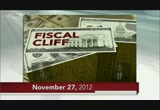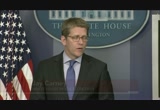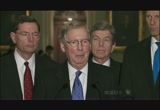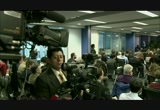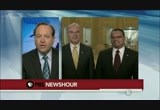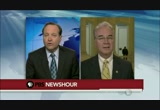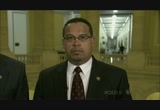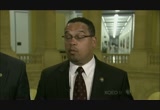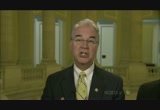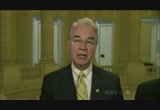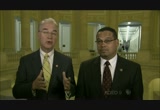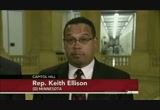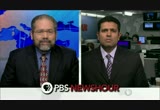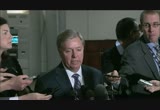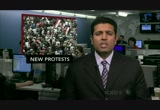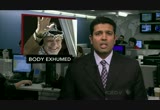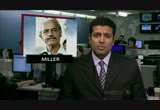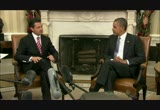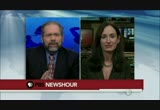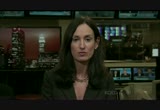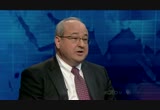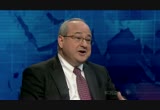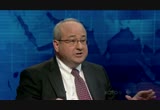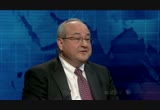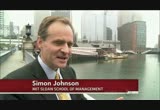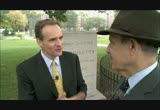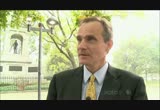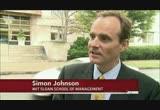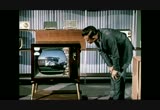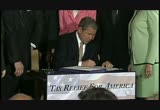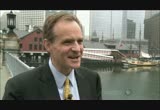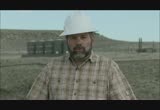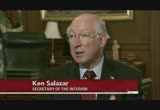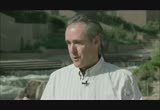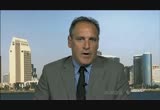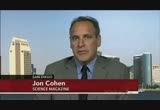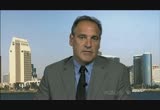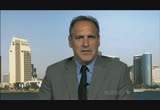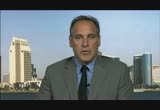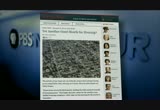tv PBS News Hour PBS November 27, 2012 3:00pm-4:00pm PST
3:00 pm
on the newshour tonight, we get two opposing views on how to avert the so-called fiscal cliff from representatives tom price and keith ellison. >> brown: then, president obama sat down with mexico's president-elect, enrique pena nieto, this afternoon. one topic for them and for us tonight: the war on drugs, on both sides of the border. >> suarez: as lawmakers talk of reducing the country's debt, paul solman offers a history lesson on centuries of federal borrowing. >> the united states was going into default. we defaulted on many obligations to foreign creditors and to our own soldiers. >> brown: plus, every month, 1,000 young americans are infected with h.i.v., and most of those with the disease don't even know they have it. hari sreenivasan looks at a new report from the c.d.c. that's all ahead on tonight's newshour. major funding for the pbs newshour has been provided by:
3:01 pm
moving our economy for 160 years. bnsf, the engine that connects us. and by the alfred p. sloan foundation. supporting science, technology, and improved economic performance and financial literacy in the 21st century. and with the ongoing support of these institutions and foundations. and... this program was made possible by the corporation for public broadcasting. and by contributions to your pbs station from viewers like you. thank you. >> brown: washington's struggle
3:02 pm
to avoid going off the "fiscal cliff" resumed in earnest today. the president moved to draw on his reelection victory for new clout with congress. the goal: a sweeping deficit agreement to avert $650 billion in spending cuts and tax increases at the start of 2013. from the white house came word that president obama will try to build public pressure on congress to raise taxes on the wealthy and prevent tax hikes for everyone else. white house spokesman jay carney. >> well, the president believes very strongly that the american people matter in this debate. because this debate is about them. the question of whether or not taxes go up on 98% of american tax payers is a very important to ordinary americans. it is not just a matter for discussion between the president and the senate minority leader. or other congressional leaders. >> brown: to that end the president met privately today
3:03 pm
with small business owners. on friday he'll travel to the philadelphia area to speak further on the issue. not to be outdone, house republicans said they'll meet with small business owners and workers in their districts arguing against the president's plan. in the senate republican my ontario leader mitch mcconnell dismissed the president's new tactics. >> as we head into the fiscal cliff negotiations, my advice to the president would be... it seems like our friends on the other side are having some difficulty turning off the campaign. we need to sit down and work this matter out. i think we have a clear sense that there's an opportunity here at the end of the year to do something something important for the country. >> brown: at the same time there were some signs on both sides of the aisle that there might be a little give in previous positions. republican senator bob corker of tennessee outlined his proposal in the "washington post." he called for tax revenue increases, including a cap on
3:04 pm
itemized deductions coupled with curbs on social security and medicare benefits. corker joined several republican senators and house members who have suggested they might abandon a longstanding pledge not to raise taxes. but the author of that pledge, conservative lobbyist grover nor quist, played down any hint he's losing influence. he called it, quote, a complete media-created frenzy. on the left, democratic senator dick durbin of illinois urged liberal groups to give way on their opposition to changes in medicare and medicaid. >> we cannot standby on the side lines in denial that this is ever going to engage us in the things that we value. we can't be so naive to believe that just taxing the rich is going to solve our problems. wlook to reform and change that is significant, that preserves many of the values and programs that brought us to political life. >> brown: for his part senate page ontario leader harry reid
3:05 pm
declared himself extremely hopeful even as the end of the year and the end of the current congress rapidly approach. as this debate has unfolded we've been sample ago variety of voices of on what should be done. tom price of georgia is chairman of the republican policy committee. democrat keith ellison of minnesota is co-chair of the congressional progressive caucus. i spoke with them a short time ago from the cannon house office building. congressmen, welcome. congressman price let's start with taxes because there's been much talk in recent days about whether your party is ready to move away from the no tax increase pledge put forward by grover nor quist. are conservative house republicans ready to do that? do you feel bound by that pledge? >> tax rates going up, having tax rates go up is not wise for the economy. that we have put on the table in our past two budgets are to address tax revenues having revenues increase by way of closing the loopholes, limiting the deductions, limiting the
3:06 pm
credits, making certain that we lower the tax rates for everybody and broaden the base. that actually gets the economy rolling again so that we can grow the revenue to the federal government by having pro growth policies. the other side of this is the spending. that hasn't been addressed by the president. we wait for the president to be able to put his spending reductions on the table. >> brown: let me ask you to stay on the taxes for a minute. when you talk about revenues not rays, are there enough details there because a lot of budget experts will say that closing loopholes like that won't be enough until we know exactly what those loopholes are. >> what we do know are the rate increases that have been recommended by the president, get enough money to run the federal government for eight days not eight months not eight weeks, but eight days. this seems to be a political activity by the president not something that actually solves the problem. we're interested in real solutions. when we're talking about the other side what we want to make certain is that what we're discussing are real solutions, things that will get the economy rolling again, get jobs created.
3:07 pm
that's where we'd like to have the discussion base right now. >> brown: keith ellison first on the taxes what's your view of looking attacks revenues as opposed to rates as the president is proposing. >> i think we need to look at both. we need to look at raising rates on the top 2%. back to the clinton era rates in which our economy did very well. but i do agree we need to close some loopholes as well. we need a balanced approach. we've already done about 1.5 trillion in cuts. what we're looking for is some revenue generated by closing the loopholes or raising rates on the top 2%. we need a balanced approach. we've seen our economy thrive even during times when rates were higher. i don't see any reason why we wouldn't want to take that step forward. we're serious and believe that we need to come together and try to hammer out a solution and not let the american people go past december 31. >> brown: let me ask you, keith ellison, about another side of this because the congressional
3:08 pm
progressive caucus put out a statement that any deal on taxes and spending, quote, should not cut medicare, medicaid or social security benefits. does that include what might be called reforms such as raising eligibility ages? is there any room there for some give? >> we don't believe there's any reason to cut benefits to people who are receiving medicare and medicare/social security but we could do some things like raise the cap on social security or we could allow medicare part-d to negotiate drug prices like the v.a. already does. there are ways to find waste, fraud and abuse and make some changes that will get more benefits to more people. but making the most vulnerable people in our society bear the burden of this fiscal problem that we're in right now, i think is unfair. it really wouldn't help our economy much. >> brown: let me bring in tom price on that. on the entitlements question. what kind of specific cuts to benefits or changes to the system do you think are
3:09 pm
required? how deep? >> please understand that current law, the president's law right now, the law of the land, makes it so that medicare, medicaid and social security all are on a road to insolvency. that's the current law. we believe that those three programs, medicaid, medicare and social security need to be saved and strengthened and secured. through our budget proposal we've had out the last two years we have put forward a proposal that actually makes it so that current retirees, current medicare recipients see no change whatsoever but in fact we save and secure the program for future generations. that the medicaid program which again is on a path to insolvency and states are complaining vociferously about this that we actually save that program from a financial standpoint. there are wonderful proposals on the table about solving and saving social security. you can't address the spending issues without fundamental really form and real solutions for medicare, medicaid and social security. >> brown: just to stay with you, won't those be unpopular?
3:10 pm
after this election do you think enough has changed to make those kinds of changes to the system? >> i'll tell you what it is unpopular is the insolvency of the program. is having all three programs go away. that's current law. that's under the president's law and the law that has been adopted by this congress previously. what we need to do is real solutions. we're happy to talk about whatever the other side wants to talk about, whatever the president wants to talk about as long as it's addressing real solutions. there's no reason to do the political side right now. what the american people said on november 6 is get back to washington and solve the challenges that we have. >> brown: mr. ellison, i mean, i think everybody talks about real changes here after the election. but do you see any changes in the rhetoric or in the actual proposals that suggest that we have moved somewhat from the election? >> well, you know, the things that my friend, dr. price is talking are things that were up for debate during the election. they were rejected. i think it's time to say we need a balanced approach.
3:11 pm
we've already cut $1.5 trillion already. now we need revenue enhancement. that could be rates and closing loopholes to do both. i must disagree that the proposals out there about medicaid and medicare are good. they're actually not very good. the american people weighed in on them as both candidates in the election offered their views. i think the american people found the president's proposals much stronger and didn't want to voucherrize or block-grant medicare and medicaid. >> it's important to appreciate that whatever mandate the president and the democratic party believe they have is no less than the mandate we have as house republicans. the american people said on november 6 they don't want government of one party rule. what they want is divided government. they've given up the challenge to go back and solve these challenges. the way we do that is together in a deliberative process. that's what i would hope that my friend mr. ellison would embrace with his party and the folks in
3:12 pm
the senate and at the white house to be able to come together and work together and solve these challenges. >> we do... brown: let me ask mr. ellison on that mandate question, would it be better, do you think, to have no deal than one that you think goes against whatever mandate came out of the election. >> i think it is the responsibility of house republicans, house democrats, senators, both martys, and the president to try to reach a deal. i don't think that we should completely abandon things that are our core values. but i think everybody has to be trying earnestly to get to a solution that makes sense for the american people. i don't subscribe to the idea we just let it go over the cliff. i think we should try to work hard on it. we're not going to allow the most vulnerable americans to shoulder the burden of this fiscal problem. those two things, i think, we've got to struggle with. i think dr. price is right. we have to talk and continue to
3:13 pm
talk about these things, understanding that there is a solution but it's going to require some flexibility. we've already gone for $1.5 trillion worth of cuts. i want to see what the other side is willing to do. >> brown: keith ellison of minnesota, tom price of georgia, thank you both very much. >> thank you. >> suarez: still to come on the newshour, mexico's president- elect comes to washington; the long history of debt in the u.s.; and h.i.v. infections in young people. but first, the other news of the day, here's hari sreenivasan. >> sreenivasan: wall street lost ground today over renewed concerns that deficit talks in washington are not making progress. the dow jones industrial average was down 89 points to close at 12,878. the nasdaq fell nine points to close below 2968. earlier, there were more signs of a recovery home prices went up in most major u.s. cities by 3% in september compared to a year ago.
3:14 pm
america's ambassador to the u.n. failed to mollify senate critics today on the attack at the u.s. consulate in benghazi, libya. susan rice met with republican senators who've criticized her for saying-- five days after the attack-- that anti-american protests were to blame. in fact, u.s. officials already knew it was a terrorist strike. today, rice blamed faulty intelligence. but senator lindsey graham said he was unimpressed. bottom line, i'm more disturbed now than i was before that the 16 september explanation about how four americans died in benghazi libya by ambassador rice i think does not do justice to the reality at the time and in hindsight clearly was completely wrong. >> sreenivasan: graham, along with senators mccain and ayotte, have said they'll oppose rice if she's nominated to be secretary of state. but independent senator joe lieberman also met with rice today, and he said he was
3:15 pm
satisfied with her explanation of events. >> i found her statements to be significant. she was just as clear and absolute as she could be that she based her testimony and her statements on sunday morning television on the talking points that she got from the intelligence community. >> sreenivasan: president obama has strongly defended rice. and a white house spokesman today criticized what he called the republican "obsession" with her initial statements on benghazi. protesters in egypt staged nationwide rallies today against egyptian president mohamed morsi and his muslim brotherhood. in cairo, more than 100,000 people filled tahrir square to condemn morsi's decree that makes his decisions immune to judicial review. earlier, there were clashes between protesters and police. the rallies were some of the largest since the overthrow of president hosni mubarak last year. in syria, government warplanes bombed towns in the north and east, in the face of new
3:16 pm
advances by rebel fighters. in one attack, the planes dropped barrels filled with explosives and gasoline just west of idlib city. reports of the dead ranged from five to 20. the regime is using intensive air raids to try to beat back rebel gains. forensic experts took samples from the remains of yasser arafat today, hoping to determine once and for all if the late palestinian leader was poisoned. arafat died in 2004. his body was briefly exhumed today in ramallah, on the west bank. we have a report from john ray of independent television news. >> reporter: eight years after they buried him they sealed yasser arafat's tomb for a second time. a dignified ceremony. the palestinian's lost leader has not been allowed to rest peacefully. shielded by blue screens, scientists took samples from his body to try to clear up a near decade of conjecture on the spf theory that says that when a
3:17 pm
gravely ill arafat said farewell to his people he was dying from the poison administered by the agents of israel. >> the time has come to maybe try to find the proof of what has happened and to bring justice. i think he deserves and the palestinian people deserve it. >> reporter: to palestinians he was the ultimate fighter for freedom. to israelis, the face of terror. they cornered him first in lebanon and then to his west bankhead quarters. allowed at last into exile he died officially from a stroke. but traces of highly toxic polonium were recently found on his clothes. the israeli secret services finally get their man. >> did israel murder, assassinate, get rid of yasser arafat. >> i can tell you a definite absolute no. they used to say that we, that
3:18 pm
our snipers had arafat on their sights and the decision was not to kill him. >> reporter: whatever dark secret this grave might or might not reveal, the timing is fortuitous. in the very week that palestinians applied to the united nations for recognition. a significant step towards the fulfillment of yasser arafat's life work. after arafat's death, experts warned after so many years definitive answers are likely to remain elusive. >> sreenivasan: swiss, french, and russian experts will examine the samples. palestinian officials said it will take at least three months to obtain any results. four women in the u.s. military filed suit in san francisco today, challenging the pentagon's ban on women in combat. they charged the ban violates the u.s. constitution and blocks women from key promotions. they also said that, in fact, women are already serving unofficially in combat units.
3:19 pm
this is the second such lawsuit filed this year against the military. greece dodged another financial bullet today, with a new infusion of bailout cash. european leaders and the international monetary fund agreed to release $57 billion in loans after 3 weeks of negotiations. the money will help greece stave off bankruptcy, recapitalize its banking industry, and pay back suppliers. the man who built the major league baseball players union into a force has died. marvin miller passed away this morning at his home in new york, after suffering liver cancer. miller led the players association for 16 years, including its first strikes and the legal battles that led to free agency for players. marvin miller was 95 years old. those are some of the day's major stories. now, back to ray. >> suarez: and we turn to mexico. at the white house today, president obama greeted the man who will soon lead the united states' neighbor to the south. >> this is a longstanding tradition. >> suarez: as cameras flashed the newly re-elected u.s. president met this afternoon
3:20 pm
with the newly elected president of of mexico. nieto who takes office saturday. >> mexico has become not simply an important bilateral partner but is today a very important multilateral, multinational leader on a whole range of issues from energy to climate change and we look forward to working with mexico not only on regional issues but also on global issues. >> we also share a very important vision, a vision of creating more jobs. we know this is very important not only for the american people but also for the mexican people. for both our nations. but not only that, we also have the opportunity to integrate north america to be participating in this part of the world. >> suarez: their most immediate challenge may be the surge of drug violence in recent years. outgoing mexican president calderon wage war on the cartels at a cost of 60,000 dead over
3:21 pm
six years. but last summer, pena nieto told the newshour's margaret warner there has to be a better way. >> it is very clear after several years of this fight on drug trafficking we have more drug consumption and drug use and drug trafficking. that means we're not moving in the right direction. things are not working. i'm not saying that we should legalize it. it's exactly the opposite. i'm against legalization. but with the countries in the hem fear and especially the u.s. should participate in the broad debate to redefine the way in which we fight drug trafficking. >> suarez: the two presidents will also have to confront illegal immigration from mexico to the u.s. the issue was largely ignored by mr. obama and his republican challenger mitt romney in the fall campaign. since election day when they lost latino voters by a lopsided margin, republicans have begun joining calls for reforms. it's also an issue with potential economic repercussions on both sides of the border. mexico and the u.s. have become
3:22 pm
vital trading partners as the mexican economy booms. it now ranks as the second largest latin american economy behind brazil's. for more on the president's meeting with pena nieto and the u.s. and mexico's war on drugs, i'm joined by shannon o'neal, a senior fellow at the council of foreign relations, and michael shifter, president of inter- american dialogue. shannon o'neal, first to you. at any given moment, the president of these two countries have plenty to talk about. but at this very moment with two new administrations about to begin, are the top agenda items in the mexico-u.s. relationship? >> well, as you heard from the press release one of the big issues that mexico comes with is the economic issue and the economic ties between the two nations. mexico is coming and wanting to bring this fully on to the agenda. it played second fiddle to security over the last presidency of president calderon. they're coming and saying this is a big issue for mexico.
3:23 pm
it's also a big issue for the united states. what is front and center today and will be these teams go forward talking to each other. also with security obviously that's been an ongoing issue. we've seen a change in that relationship over the last six years with president kawd enron. it had continue to deepen, the cooperation there. the third issue they talked about is the issue of migration. that's an important issue for mexico since so many mexicans are here in the united states but an important issue for the united states and one that will likely come on the agenda once president obama is back in office in his second term. >> suarez: michael shifter, same question. what are the pressing agenda items for the two presidencies? do you have anything to add to shannon o'neal's good summary? >> i think the summary is very good. i think the three are economic relations, energy, potential cooperation with the united states and mexico, security issue. i would also add the drug question is related to security but is separate from security.
3:24 pm
the drug issue has been a source of a lot of strain and friction between the united states and mexico. there's a sense that there's consumption in the united states. that is fueling some of the criminal violence that has gotten out of control in mexico. immigration, of course, is a crucial issue which is very important for mexico, for the united states it's not seen as a foreign policy issue. it's seen as a domestic issue. for mexico it's extremely important, the relationship. to the extent there could be any progress on immigration reform in the united states, that would be very much welcome in mexico. >> suarez: as you note, security and drugs are both related and separate at the same time. but just when american voters in a couple of states have decriminalized the use of marijuana we're getting a new mexican president who had signaled during the campaign that he wanted to depart from his predecessor's policy on the war on drugs. as he said how he'll do that? >> he hasn't really spelled it out. we'll learn more once he's
3:25 pm
inaugurated on saturday and when he begins to pick his cabinet. but we do know that he's going to focus on reducing violence and not give as high a priority on drug enter diction and other kinds of goals that are related to the drug war in particular. i think these votes in colorado and washington state have not gone unnoticed in mexico. i think it's going to be complicated. it reflects a shift in public opinion in the united states. it's going to be hard for a mexican leader to justify that people getting killed in mexico, to fight cartels that are trafficking in marijuana when they're being legalized in some states in the united states. that's going to be a complication that's going to have to be addressed in the bilateral relationship. >> suarez: shannon o'neal, all the way from street vendors to the president's office, there's a consensus in mexico that this is an american problem but one that is mexico's to deal with. how is pena nieto going to deaver from president kald
3:26 pm
enron. >> as michael just said there's going to be a shift on a war from drug trafficking to reducing violence. some of the things you do to fight drug trafficking and reduce violence are the same things. they're professionalizing your police forces, improving strengthening your court system. some things are different. particularly the priorities that you place on your police forces. do they go after drug king pins or do they actually go off people who extort, kidnap and steal cars and commit other types of assaults? that type of prioritization we might see a change in because that would change crimes that hit mexicans day to day more than in many cases the transit of drugs up to its northern neighborhood. >> suarez: conversely the migration problem is one that has its impact felt very heavily in the united states but there's been kind of an ambivalence in mexican governing circles about what to do about it. today president-elect pena nieto mentioned we want to be a part
3:27 pm
of this solution. what form could that take? shannon o'neal. >> sorry. thank you. you know, one thing they could do, mexicans have learned in the past to not get too involved in our domestic politics because it can be counterproductive because this is seen in the united states, as you nengsed, as a domestic political issue. br things mexico could do to help if there was a comprehensive or some some sort of immigration reform. things like improving their side of the border, monitoring their side of the border, for things like people crossing, dealing with some of the back-and-forth not just of goods but also of people. it's something they might be willing to join in some sort of effort. i do think this is an issue where mexico, if there was a change in the united states, it would be a big benefit for u.s.-mexico relations and take some of the tensions out. but i think there's a wariness to really dive into the policy debate by mexico because they have seen that in the past be
3:28 pm
less than productive. >> suarez: don't they also have to be careful because the united states is a major investor in the mexican economy. >> shutly. they continue to be a very important solicitor of mexico's domestic economy so there has to be a balance obviously that has to be achieved. the mexico or mexican economy does benefit enormously from the mexican population that's in the united states but we've seen a tremendous shift in recent years that really illegal immigration from mexico to the united states is at its lowest level in decades which really stabilized. that has enormous implications. some of the other issues that are on the agenda perhaps would get higher priority because the immigration question is not as severe. it is still politically very sensitive. in the united states and in mexico. in terms of the numbers we've seen some trends that are quite encouraging.
3:29 pm
>> suarez: shannon o'neal, what about the trade ties between the two? nafta is almost 20 years oal. both sides say they're the others' among their most important trade partners. has the relationship gone about as far as it can go or is a growing mexico creating new promise? >> i think it's the latter. i think a growing mexico creates new promise not just for mexicans but for the united states. you've seen over the last 20 years with nafta, you've seen not just more trade go back and forth but a deepening of the ties of the production ties so what's coming from mexico and what's going to mexico is not necessarily finished goods -- blenders and cars and things like that -- but the pieces and parts of those types of things. some come from the united states go to mexico are put together there, things are added. it's brought back to the united states and finished here, for instance. so that type of trade where one company would have aspects of its production on both sides of the border also including canada on three borders, that sort of
3:30 pm
thing is a longstanding total change in the way we make things in the united states but it's something that can continue to deepen. as we think about how to grow in the united states to grow out of recession, exports have been bipartisan support for increasing exports. how are we going to do that? it's going to come through ties with our neighbors with canada and particularly with mexico. >> two crucial issues. 20 years ago in nafta were labor mobility and energy. they are much more possible to deal with today than 20 years ago. that could make a tremendous difference. >> suarez: michael shifter, shannon o'neal, thank you both. >> thank you. >> brown: and we come back to the great debate over budgets, deficits, taxes and spending, with yet another viewpoint, this one with some historical perspective. newshour economics correspondent paul solman is on the case, part of his ongoing reporting, "making sense of financial
3:31 pm
news." reporter: our allegedly tragic trillion dollar annual budget deficits. swelling our supposedly unsustainable $16 trillion national debt. more borrowing, it's said, means the proverbial road to ruin. some think then that the fiscal cliff slash spending and taxes is not economic suicide but the very opposite. the last resort for avoiding a fatal whirlpool of debt. so what about more debt? will it destroy us or won't it? how bad would it be to barrel over the cliff? enter former i.m.f. economist simon johnson of m.i.t. he's written a book, white house burning, on the history of u.s. debt, its why's and wherefors
3:32 pm
and get this its considerable virtues. we asked if he could provide a tv version. the answer was a mobile history lesson. starting at the museum where every 15 minutes they re-enact the dumping that helped make a town famous and a group of contentious colonies united. so to begin you're in boston. what's your fundamental thesis? >> the american republic is born partially in a tax revolt. this is the at a party site where they threw the at a over because they didn't like the tax system. so this has been a fundamental debate and argument from the beginning of the american republic. we come back today to exactly the same sorts of issues. >> country men... reporter: well, not exactly the same. the at a parties of the past included smugglers protesting england having lowered the tax on tea, threatening their contraband business.
3:33 pm
between legend and fact, legend usually wins. the fact is as between paying now or paying later, americans have just about always preferred debt to taxes. debt to pay the very first army, for example. this is the spot on the cambridge common where, leng end has it, general washington first amassed his troops under a now dead elm and faced the basic question of government economics. >> how was going to pay them? how is he going to feed and clothe them? where will they get their clothes? that's a question we're still trying to answer. how do we tax ourselves and what's a reasonable amount of federal government spending and on what? >> reporter: what did america in the making do? we didn't much tax ourselves. instead we began to borrow as a new united country. >> it was the idea primarily of alexander hamilton who was the first secretary of the treasury under george washington. he realized you needed to have the ability to tax and the
3:34 pm
ability to issue debt and manage debt and bring debt down. >> we also stiffed creditors back then too. >> absolutely. the united states was born in default. we defaulted on many obligations to foreign creditors and to our own soldiers. >> reporter: okay. so america was born and swaddled in debt. and then about four score and seven years later when the country threatened to break in two, it was borrowing that distinguished the winners from the loser s. in the civil war the north financed itself by issuing bonds and developing a tax system. nobody was very happy about that. it worked. the south financed itself by printing money and got a hyperinflation. destabilizing, further destabilizing its economy. those are two different ways to finance a big ramp-up in government activity. the north won in part because they had a better approach, the hamilton approach, to public finance. >> reporter: that approach was to print i.o.u.s, bonds, and
3:35 pm
come up with a way to market them, mainly in europe, to people who had the money and thought, hey, i'm going to get it back with a good rate of interest. they also told them to retail investors that made the bonds relatively small denominations and had a big marketing push. the first time anybody in this country or almost anywhere else had tried to sell bonds to ordinary, regular people. big success. >> reporter: so it was whenever america found itself at war. peaks of debt as a percent of national at the peak of every con flag layings from the revolution through the war of 1812 to the civil war and world war i. the next big bump in debt added a new reason to borrow. it came during peacetime. new debt to comebat the great depression of the 1930s. that hit america and other market economies. >> massive slump in g.d.p. and output and conventional economic
3:36 pm
and standard economic practice just didn't work for turning these economies around. >> reporter: had you been born, you would have been in england at the time. that was when john maynard keynes became most famous for his prescription spend, spend, spend, that's how you get the system up and moving again by pouring money into it. >> yes. when you're in a depression. so in that situation keynes said that more government spending could help restart the private sector by having the government lead the way. >> reporter: when j.m. keynes talked, people listened. among them johnson's academic predecessors. >> people working here at m.i.t. the department of economics and in other leading universities became convinced that the government could play a different role and a more helpful role in the economy and supporting the macro economy compared to what the previous orthodoxy had been before the 1930s. >> reporter: but that meant going into more and more debt. that's a good thing then you say? >> it meant being careful with
3:37 pm
the debt still. it meant that deficit spending was something that could be very useful to you. and when the economy needed some help. >> reporter: very useful and, of course, borrowing proved very necessary when world war ii broke out. total u.s. debt soared to 120% of g.d.p. but after the war, the u.s. economy soared too. by the late 1960s economic growth had wiggled the percentage down near 40% of g.d.p. despite new wars on poverty and vietnam. again, debt had delivered us from evil and it seemed into prosperity. and then came the 1980s and the tax cuts of ronald reagan combined with greater defense spending leading to hugely higher annual deficits covered by borrowing. and thus again a swelling nationa debt. but with no wars at all. then under presidents george
3:38 pm
h.w. bush and bill clinton we took action. for a while, both parties agreed, says simon johnson. >> there was a bipartisan agreement to raise revenue and put something of a damper on spending. so that's an important moment in the bigger picture, of course, that was just a small hesitation on the part of a much larger national debt. >> reporter: because in the bigger picture, a president just can't accomplish very much if he's cutting spending and won't raise taxes. and so yet again, more borrowing. under presidents george w. bush and barack obama. higher deficits and debt that, because of the graying baby boom, are fated to get even worse. >> the population was always going to age, the baby boomers were going to retire. they were paying a lot of social security contributions in 1990s. we were always going to shift into structural deficit for that reason. >> reporter: that's why even though we've been in deeper hot
3:39 pm
water before as a percentage of the economy, this time really may be different. with the baby boom hanging it up, increasing our debt load now presents a clear and future danger. and thus this era's key questions. >> if you want to keep social security and you want to keep medicare and if yes how are you going to pay for it? i don't suggest the answer will be sell more debt to the chinese. you have to pay the taxes to support the social insurance programs if that's what you want to keep. >> reporter: but americans do not want to pay higher taxes. >> no one wants to pay higher taxes. everybody is happy to have someone else pay higher taxes. this is where we come to in the conversation. what do you want government to do? we have ourselves into the mind set, the government can give me stuff but someone else can pay for it. that is incredibly dangerous. it's never been the american problem but it is the american problem today. >> reporter: last stop back to cambridge common. last point, some people think going over the cliff won't be
3:40 pm
all that catastrophic. but economist simon johnson thinks it would be a disaster. you don't just change course overnight. >> if you go over the cliff in a disorganized way with maximum amount of political confrontation, that could be very bad for us and much worse for the world. we need to make some fiscal adjustments. some of those things include higher revenue and bringing spending under control. i'm in favor of that. but charging off the cliff as we struggle at each other's throats very bad. >> reporter: very bad perhaps but not as things now stand impossible to imagine. >> suarez: we'll be back shortly with some sobering figures on the spread of h.i.v. in young americans. but first, this is pledge week on pbs. this break allows your public television station to ask for your support, and that support helps keep programs like ours on the air.
3:41 pm
>> suarez: for those stations not taking a pledge break, we take a second look at eastern utah, and a compromise that will allow companies to extract the region's natural gas, while preserving its environment. i reported from there earlier this year. the banks of the white river in eastern utah are perfectly quiet, in a way it's sometimes hard to find in a world of seven billion people-- just the sounds of gently flowing water, a hint of a breeze, the occasional bird. the gorgeous vistas and rare solitude sit on public land thousands of feet above a bonanza trapped deep in the earth. from high above, it's easy to see how the gas industry has changed the landscape, with gas wells by the thousands altering the fragile desert ecosystem.
3:42 pm
utah environmentalists say the view from the air and from the canyon floor illustrate why they want these public lands protected. >> you know, what families find when they come here, what outfitters, what americans come to experience this place, it's the quiet, it's the solitude, it's that you don't have the sight and sounds of human development around you. it's a place where people can come and restore themselves. there are more cliffs on this side. and that's an area where there really are just these fantastic spires and columns. and it's pretty remarkable. >> suarez: a year earlier, stephen bloch from the southern utah wilderness alliance brought gas industry representatives from anadarko petroleum corporation to this same stretch of river to convince the industry giant to consider the impact on pristine riverbanks in their pending request to drill in the greater natural buttes region. anadarko's existing permits were expiring. the company wanted to bring out
3:43 pm
gas left behind by past wells and old-fashioned drilling methods and make a new plan with the united states bureau of land management. the wilderness alliance asked anadarko to drill further away from the river floors, to erect wells away from the canyon rims, so they can't be seen by canoers and hikers. the energy company anadarko had a lot riding on the greater natural buttes project, and the numbers are staggering: 3,700 wells, six trillion cubic feet of gas reserves, billions to be paid in royalties to the state government of utah and to the federal government, and thousands of jobs created. the only question was, could they pull all that gas out of the ground and make peace with environmentalists and indian tribes to save one of america's last great landscapes? >> the several feet that we would see in this, we could drill in an hour or less. >> suarez: brad miller, who runs regulatory affairs for anadarko, understood the importance of
3:44 pm
bringing environmental groups on board. >> if people can come to an agreement before you have to go to a regulatory agency to discuss the opportunities for development, of course that's going to be a plus for the company and for all the stakeholders involved. >> suarez: the secretary of the interior oversees the bureau of land management. with the parties already in agreement, there's no litigation, less hassle and more natural gas going to market right away. >> it is my view that protecting the environment and developing oil and gas are not mutually exclusive. those who say they are are providing us a false choice. >> suarez: so the wilderness alliance gets a pristine river valley for its constituents, and anadarko gets the natural gas underneath it for its shareholders. >> i think what we have shown here and in a number of other places in utah is that we can find that kind of middle ground, that there are compromises that
3:45 pm
can be reached that protect the special places, while still allowing for a vibrant, for a robust level of natural gas and oil development. >> it is a shining model and a shining example of what we need to try to accomplish across the board in the industry. let's work collaboratively with the environmental community and the other stakeholders, the local governments, the regulators as well, to meet everybody's need, because bringing the important natural gas resource to america is extremely important. >> my advocacy to the industry is, follow those best practices that some companies are following. and, therefore, when we develop in those places, what we're going to do is to minimize the footprint by the new technologies on horizontal drilling and placing multiple wells on one pad and taking care of water and taking care of emissions. those are hugely win-win solutions. >> suarez: multiple wells drilled from the same spot mean fewer roads kicking up dust across the wilderness, fewer
3:46 pm
truck runs carrying millions of gallons of water for high- pressure underground pumping to crack open gas deposits. natural gas isn't the only thing out here to sell. wilderness recreation is a big industry. the white river is a popular spot for canoeing outfitters. centennial canoe has run trips on the river for 25 years. >> you feel like you're on a wilderness adventure, rather than being at a zoo, where the animals are caged, or being in the city or an aquarium. this is all natural. it's real. >> suarez: are the battles over? can indian tribes, environmentalists, energy companies and the federal government walk shoulder-to- shoulder into a gorgeous utah sunset? not exactly. >> this area is an island in a sea of natural gas wells. >> suarez: for guys like bloch, it's never really over. he pointed out land near utah's
3:47 pm
desolation canyon, where the bureau of land management recently approved 1,298 new wells for the natural gas company gasco. >> the desolation canyon stretch of the green river is truly one of the gems of american public lands. it's this remarkably wild landscape, one of the largest roadless areas in the lower 48. and that is going to be lost. the level of development will be significant. it will significantly impact that area. >> suarez: the decision was a huge disappointment for bloch, who says, once these places are developed, there's no going back. though new leases require companies to leave the land the way they found it, a desert is very slow to heal and hard to reclaim. >> brown: you can view more of our reports on energy online.
3:48 pm
>> brown: finally tonight, a new government report finds disturbing rates of h.i.v. infections among young americans. hari sreenivasan is back with that story. >> sreenivasan: researchers from the centers for disease control said they are worried about the latest findings. out of 50,000 infections, one out of every four strike young people between the ages of 13 and 24. some 60% of younger americans do not know they are infected. and 72% of new cases in that population were found among young men who have sex with men. the data was released in advance of world aids day this weekend. for more on the implications of these findings, we turn to jon cohen, an author and writer for "science" magazine who has long covered the aids beat. >> thanks for having me. sreenivasan: just a few weeks ago we heard from u.n. rates that the rates of infections were decreasing, the rates of treatment are up. yet we see this particular population hit so hard. why is that? >> well, young people don't have
3:49 pm
as much experience. they need more education. they also traditionally take more risks. >> sreenivasan: then there's a specific focus to younger male african-americans in specific that are having more unprotected sex perhaps. what is it about this particular community that makes this such a bigger problem? >> we've seen a huge shift in the united states where the epidemic began in gay men who upper middle class largely living in the cities or middle class and it shifted to the south in poor african-american men many who have sex with men and don't identity with gay communities. they're often disenfranchised from health care, don't have access. their education, their schools might not offer any information or little information about h.i.v., and there's very little encouragement in the community to get tested as well. the role of the church plays a factor. and if you're having sex with a community of people who already
3:50 pm
have a lot of virus, your odds of getting infected are much much higher. >> sreenivasan: what about that testing element of it? the c.d.c., they've been trying for years to try to increase awareness and increase testing. why isn't it getting through in these specific communities? >> it comes down to the reactions of local communities, of parents, of schools and people are queasy about kids and sex. that's the way it is in much of the world. it certainly is more pronounced in some rural areas. i traveled through the south extensively doing an h.i.v. project last spring. in mississippi which has one of the highest h.i.v. new infection rates in the country, there wasn't a single clinic designed for lesbian gay bisexual transgenders and that's going to reflect with the youth as well. >> sreenivasan: what can the c.d.c. or anyone do about this when it comes to those sort of
3:51 pm
larger cultural problems you're talking' tackling? >> the c.d.c. is using world aids day to sound the alarm bells. they hope there's a trickle-down effect and the communities take it more seriously and that parents sit down and talk with their kids. it's going to come down to what communities do. i mean there are public schools that offer h.i.v. testing even. that's not going to fly in a lot of places but it's going to take a much more aggressive approach in the areas that are hardest hit and more honesty and becoming more up front about the stigma that exists in particular for young day by sexual transgender men, many of whom they would not ever move toward a community of people who said they were part of that community. so you have to understand who the kids are who are taking the risks and are are becoming infected at higher rates. >> sreenivasan: is there a level or a factor of invincibility where the young don't feel like they are threatened by all of the things? i mean as you sort of slide up
3:52 pm
that ladder and go out of the teenager and into the 8- to 25-year-olds you see pretty low rates as well. >> if you look at the risk factors, it's all pretty obvious. it's alcohol. so we all know that when kids start drinking, they don't control their alcohol use. when you don't control your alcohol use, you're going to take risks you otherwise wouldn't take. it's not using condoms. it's access to condoms. how do you get a condom when you're a 15-year-old gay man living in the south? what do you do? you walk into a pharmacy and actually go up to the pharmacist and, you know, all that stuff is incredibly stigmatized and frightening. so i think what communities have to do is really address the problem through the lens of, are we doing everything possible to help these kids protect themselves? >> sreenivasan: one of the things that people don't necessarily look at very often it seems very cold and calculated is the numerical
3:53 pm
cost. obviously the worst cost is someone's life. but one of the things that was interesting to me in this report that said that these folks that are infected so young could cost the system $400,000, a cost that all of us are bearing in some ways. >> sure. one of the things that the report is trying to emphasize and that i think is critical. if you don't know you're infeked you're not going to start on treatment. the treatment works. and the treatment might be expensive. but we know that people who are on treatment and take it every day reduce their own infectiousness so if we're really going to start curbing the epidemic in communities, using treatment as a prevention tool is critical. you have to know your status. >> sreenivasan: later this week, john, you're going to be offering a broader status report on the global aids fight. that will be on our website. thanks so much. >> thank you. >> suarez: again, the major developments of the day, the white house stepped up the pressure to get a deal on tax hikes for the wealthy and spending cuts. america's ambassador to the
3:54 pm
u.n., susan rice, met with republican critics of her statements about the attack on the u.s. consulate in benghazi, libya. but the three senators said her answers did little to ease their concerns. and there were nationwide protests in egypt against president muhammad morsi and his islamist backers. some 100,000 people turned out in cairo alone. and some things to look for online, beginning with the latest case-shiller housing numbers. the report, released today, shows that prices rose for the sixth consecutive month. the details are on our business page. plus, want to know the secret to getting an employer's attention or a foot in the door? "ask the headhunter" can be found on the rundown. all that and more is on our web site, newshour.pbs.org. >> suarez: and that's the newshour for tonight. on wednesday, we'll preview a key vote at the united nations on palestinian statehood. i'm ray suarez. >> brown: and i'm jeffrey brown. we'll see you online, and again here tomorrow evening. thank you, and good night.
3:55 pm
major funding for the pbs newshour has been provided by: >> music is a universal >> bnsf railway. >> macarthur foundation. and with the ongoing support of these institutions and foundations. and... this program was made possible by the corporation for public broadcasting. and by contributions to your pbs station from viewers like you. captioning sponsored by macneil/lehrer productions captioned by media access group at wgbh access.wgbh.org
147 Views
IN COLLECTIONS
KQED (PBS) Television Archive
Television Archive  Television Archive News Search Service
Television Archive News Search Service 
Uploaded by TV Archive on

 Live Music Archive
Live Music Archive Librivox Free Audio
Librivox Free Audio Metropolitan Museum
Metropolitan Museum Cleveland Museum of Art
Cleveland Museum of Art Internet Arcade
Internet Arcade Console Living Room
Console Living Room Books to Borrow
Books to Borrow Open Library
Open Library TV News
TV News Understanding 9/11
Understanding 9/11